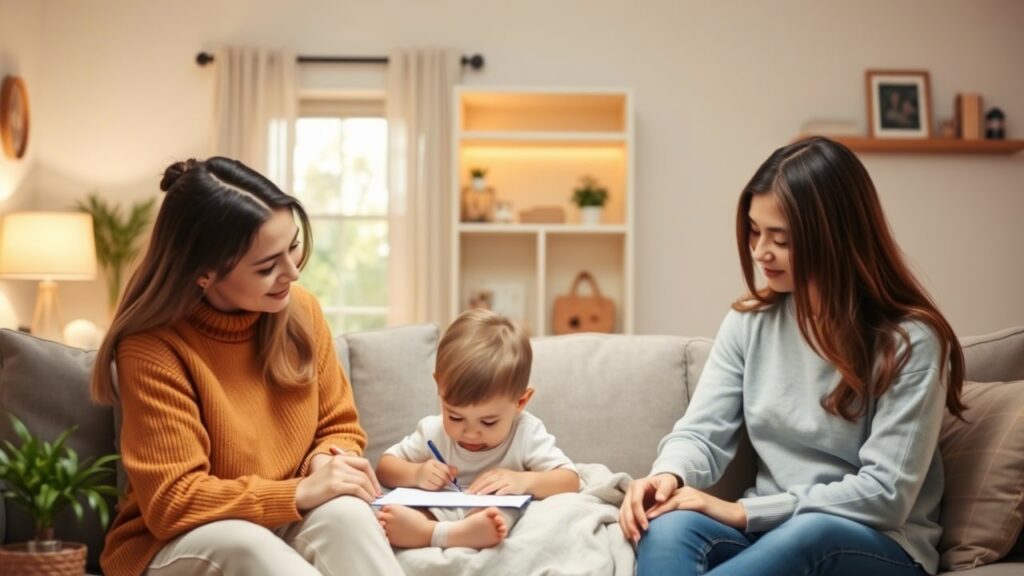Divorce is a major life change, not just for the couple parting ways but especially for any children involved. It’s normal for most kids to feel a range of emotions, confusion, sadness, anger, relief, and anxiety, depending on the situation. As parents, even though you’re going through your own emotional upheaval, your children’s well-being is a top priority. The goal during a divorce (and afterwards) is to maintain a stable, loving environment for your child despite the changes in the family structure. It’s about cooperation (or at least civility) between you and your ex regarding parenting, so your child feels secure and has consistency. It’s not always easy, it can be extremely hard if the divorce is contentious, but the effort is worth it. Studies show that what affects kids most isn’t the divorce per se but the level of conflict and instability they’re exposed to. Kids do best when parents co-parent with minimal hostility and maintain routines and support.
When my friend Julia and her husband divorced, their 7-year-old son was upset and confused. Julia and her ex made a pact that no matter their disagreements, they would never badmouth each other in front of their son and keep his routine as intact as possible. They sat down with him to explain (in simple terms) that Mommy and Daddy would live in different houses, but he would have homes with both, and both loved him. They said, “You have the right to two homes where you are loved and cared for, and that will never change,” echoing a “Bill of Rights” for him.
Over the following months, they coordinated school pickups, maintained his bedtime schedule, whether at Mom’s or Dad’s, and even had a weekly family dinner (all three of them) because it was important to their son. It wasn’t always comfortable for the parents, but it provided an anchor of stability for the child. He’s a teen now, and he once told me he never felt like he “lost” a family, it just changed shape.
Here are some key tips for positive parenting during a divorce:
Communicate Openly with Your Child (in an Age-Appropriate Way):
Even though kids don’t need to know all of the nasty and adult issues that come along with a divorce, they need to know the core issues and understand that they are not to blame. Let’s sit together and agree on a unified stance, or do so separately. Describe the current situation and explain that Mommy and Daddy (or Mommy/Mommy, or Daddy/Daddy) will no longer be married and will live separately. Still, the child will continue to spend time with both parents. Emphasize both parent’s unconditional love for the child, which will not change. Ask them to please share everything they are thinking so they can voice their concerns and encourage them to do so. They might ask the toughest questions like (“Was it because I was bad?” or “Can you get back together?”). Prepare yourself to offer reassurance and be honest, but gentle. “No, it’s not anything you did, this is about us. Parents sometimes decide they can’t stay married for a number of reasons, but it’s not about you, and it’s not about you.”
With great love, we both feel immensely for you.” If they ask if you’ll reconcile and you know it’s not happening, kindly but firmly, “We won’t be getting back together, but we will always be here for you.” Tell them. Grown children respect honesty; ambiguity is often far worse.
Maintain Routines and Consistency:
As much as possible, keep the child’s daily and weekly routines the same. Continue if they always go to soccer on Saturdays or Grandma’s on Sundays. Bedtime, school routines, and extracurriculars keep them steady. If the child is moving between two homes, try to keep rules and schedules consistent between them (if parents cannot agree). For instance, if bedtime is 9 PM at Mom’s, it should ideally be 9 PM at Dad’s. Consistency = security. One brochure sums it well: kids love predictability, so “having a routine established at home can alleviate their anxiety during uncertain times” works at both homes. Maybe a simple calendar, Monday-Tuesday with Mom, Wednesday with Dad…” Visuals work with younger kids. Knowing what to expect at all times makes kids feel more in control, even when there is disruption.
Presented Front ( Front of the Kids):
Even if you and your ex are arguing behind closed doors, try your best to keep it away from the children. It’s incredibly awful for kids to witness their parents fighting viciously during a divorce. It can make them feel torn in loyalty and unsafe. Never force the child to take sides or relay messages (“Tell your father child’s late on the support payment!” big no-no). If talking is hard, communicate directly with the co-parent, like aduGrandma’sugh email or a mediator. And never badmouth the other parent to your kid. It can be tempting if emotions run high, but biting your tongue is a true act of love for your child. Every child has an innate need to love both parents. Mom’s hearing one parent trash the other is heartbreaking and confusing. If you need to vent, do it with a therapist or friend away from the kids.
Reassure the Child of Their “Bill of Rights”:
There’s a concept called the Children’s Bill of Rights in divorce.” Some key ones: They have a right to love both parents and not be forced to choose. They have the right to be shielded from adult conflict. They have the right not to be messengers or spies between parents. They have a right to continue to be kids, which means they do not have to hear about legal or money troubles, etc.
Keep these in mind, our interactions. For example, if your child says, “I miss Mom when I’m with you, Dad,” a positive parenting response is, “I know you do, that’s okay. Mommy misses you, too, and you’ll see her tomorrow. How about we send a picture of her when you return?” Encourage that love. It’s not a competition; a child who feels free to love both parents adjusts much better.
Co-Parent with Civility (Cooperation if Possible):
Involving both parents in a child’s parenting, even in their divorce, is termed co-parenting and entails both parents talking and respecting each other. Looking at it as a business where you both care for a ‘property’, the property would be the children. The two would work effectively as colleagues rather than and would keep the children’s interests in the divorce in order. Divide and conquer co-parenting by informing each other of the child’s major events, so you keep saving up on the ’emotional budget’. The child, parents, and siblings all have to feel the anchored end of the imbalance too consistently. If tackling the co-parenting issue personally fails to combat the situation, co-parenting apps and emails may help. If this conflict is too high,” and the parents I’d rather work “new parenting, each co-parent does their routine, and that’s nothing separately to avoid too much conflict. The neutral information and standard co-parenting schedules help the child. Until it’s likely to use split parenting, which helps until parents calm down. The mental and emotional well-being of the children is profoundly more influenced by the parents relationship than by the co-parents.
Provide Emotional Support and Outlet:
Please encourage your child to share and express their feelings about the divorce. Let them know feeling sad, mad, or confused is okay. Some kids won’t express upset, but it will burden a stressed parent, so actively check in: “I know this is a big change. How are you feeling about things? You can always talk to me or Dad about it.” If they’re young, play can be a way for them to work out feelings. You might see them role-playing with dolls about “Mom and Dad in different houses” That’s normal. Older kids might prefer talking to a third party, like a counselor or a trusted relative. Consider counseling for the child (and yourself) as a safe space to process emotions. I enrolled my son in a “Banana Splits” group at school (a support group for kids of divorce), and it really helped him realize he wasn’t alone and gave him tools to cope. Keep an eye out for signs of your child struggling with regression in younger ones (clinginess, bedwetting), behavior issues in older ones, trouble in school, or acting out. These can be cries for help that they need extra support in navigating their feelings.
Keep Both Parents Involved (if safe and possible):
Unless there are major issues of abuse or danger, it’s generally best for the child to have a continuing relationship with both parents. Support your child’s time with your ex. That means not using visitation as a weapon (don’t withhold the child to punish the other). Conversely, if you’re the non-custodial parent, show up reliably for your time. Be flexible if the child “needs an adjustment, like if that event falls on your day but they want to go with the other parent, think of the big picture and try to accommodate. Show up to school events or sports, even on the other parent’s day, kids feel proud (and relieved) to see both parents cheering them on, even if they are separate. One great tip I heard was to have the same rituals across both homes. For example, maybe both parents read the same bedtime book or say the same nightly phrase (“Sweet dreams, see you in the morning!”). Small, but it signals unity in care.
Never Make the Child Your Confidant or Go-Between:
In the loneliness of divorce, a parent might be tempted to lean emotionally on the child or inquire about the other parent’s personal life via the child. Rit’s this. It’s not the child’s role to support you or report back on your ex. They shouldn’t hear children say, “Your father/mother is making me so angry” or “Tell your mother not to be late with the payment”. This puts enormous stress on them. Suppose you find an adult outlet, friends, a therapist, or a support group for those conversations. Let your child be a child.
Create New Family Traditions
One thing that can help kids (and you) not dwell only on what’s changed is to create some new routines or traditions in your “new normal.” Your parents have Friday pizza and movie night at Mom’s house, or Sunday pancake breakfast at Dad’s. New small rituals can rebuild a sense of family, even if it’s a family with two homes. Emphasize that “we are still a family.” They might have two households, but still have one family that has just stretched a bit. As one resource put it, every child has the right to call themselves still a family, no matter how time is split.
Divorce is tough, no sugarcoating it. But I often share this with divorced parents: children can thrive after a divorce if they have two parents who put them first. I’ve seen kids grow up well-adjusted, shouldn’t it? Because their divorced parents worked hard to be civil, to collaborate for the kids ‘ sake, and to ensure the kids never felt unloved or in the middle. In fact, in some cases, kids blossom more after a divorce because the home atmosphere is more peaceful than during a bad marriage.
If things between you and your ex are particularly hostile, consider involving a professional mediator or counselor for co-parenting sessions. “It helps keep discussions productive and focused on the children. Mom also has many good books and programs. Dad’s parenting after divorce.
Remember the big three for you: Love, Stability, and Shielding from Conflict. If those are in place, you’re doing a great job. And take care of yourself through the process, too. When you’re emotionally okay, you can be the steady rock your child needs as their world shifts. With time, healing happens, routines set in, and your child will adapt, knowing they have Mom and Dad in their corner, even if not under the same roof.










